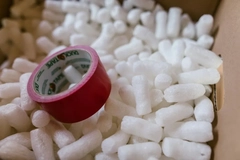Nexam and Verdofoam develop technology to create bio-based foam
Key takeaways
- Nexam Chemical and Verdofoam develop lightweight bio-based foam using additive technology.
- The PLA foam matches the performance of EPS for packaging and insulation.
- The innovation aims to reduce reliance on EPS, cutting emissions from e-commerce packaging.

Nexam Chemical and Verdofoam, a Netherlands-based biotech company, have partnered to expand Nexam’s lightweight product portfolio with the development of a bio-based foam using “breakthrough” additive technology.
The foam is lightweight and has the same shock-absorbing properties as traditional packaging foam, according to Nexam.
The solution aims to reduce reliance on conventional fossil-based polystyrene (EPS) used in e-commerce packaging, but has many applications, such as other packaging and insulation materials.
Ronnie Törnqvist, CEO at Nexam Chemical, says: “This is a clear breakthrough. Being able to create bio-based foam (PLA foam) opens up an entirely new market for us. We are demonstrating concretely how our technology can help reduce the climate footprint of plastics without compromising performance or functionality.”

Bio-based alternatives
Nexam explains that the global volume of EPS used in packaging is around 5.8 million tons per year, corresponding to roughly 18-30 million tons of CO2 annually.
“Being able now to replace parts of this volume with bio-based alternatives presents a significant opportunity to reduce fossil dependency and lower climate impact,” says the company.
Bio-based solutions are gaining popularity among consumers seeking environmentally friendly alternatives to fossil-based plastics, although NGOs have raised concerns about the actual environmental impact of these materials.
Dr. Kimberly Warner, senior scientist at Oceana, told Packaging Insights that bioplastics are a “false solution” to reducing plastic pollution.
Bioplastic research is also expanding. Recently, scientists developed a method to convert food waste sugars into natural plastic films that can replace petroleum-based packaging.
Moreover, Aimplas continues to lead the Bioprocess project, enhancing the mechanical and barrier properties of bioplastics. Uluu, an Australian-based start-up, secured funding to build a plant that will scale its technology, which converts seaweed into a bio-based plastic.











